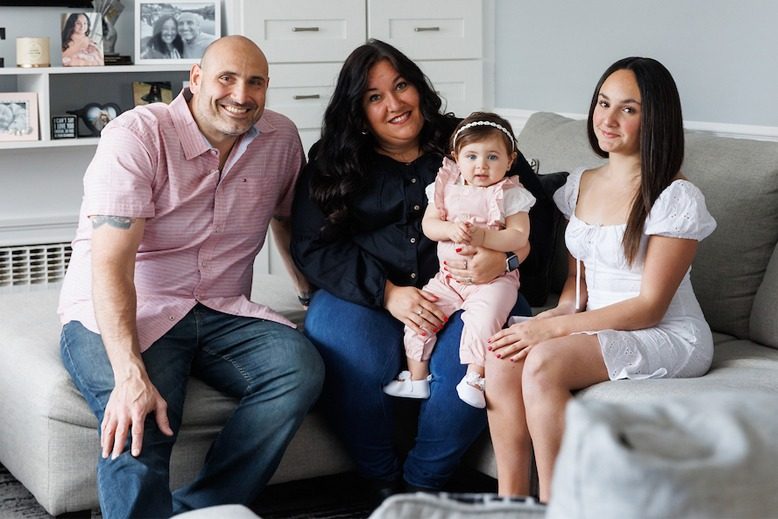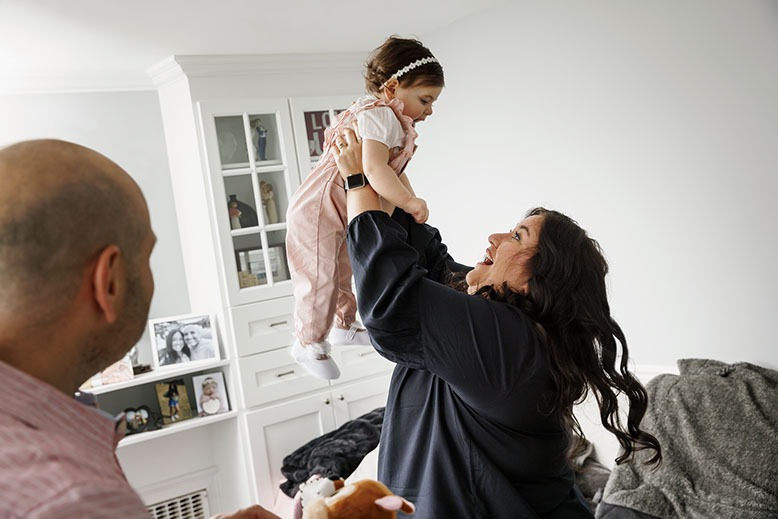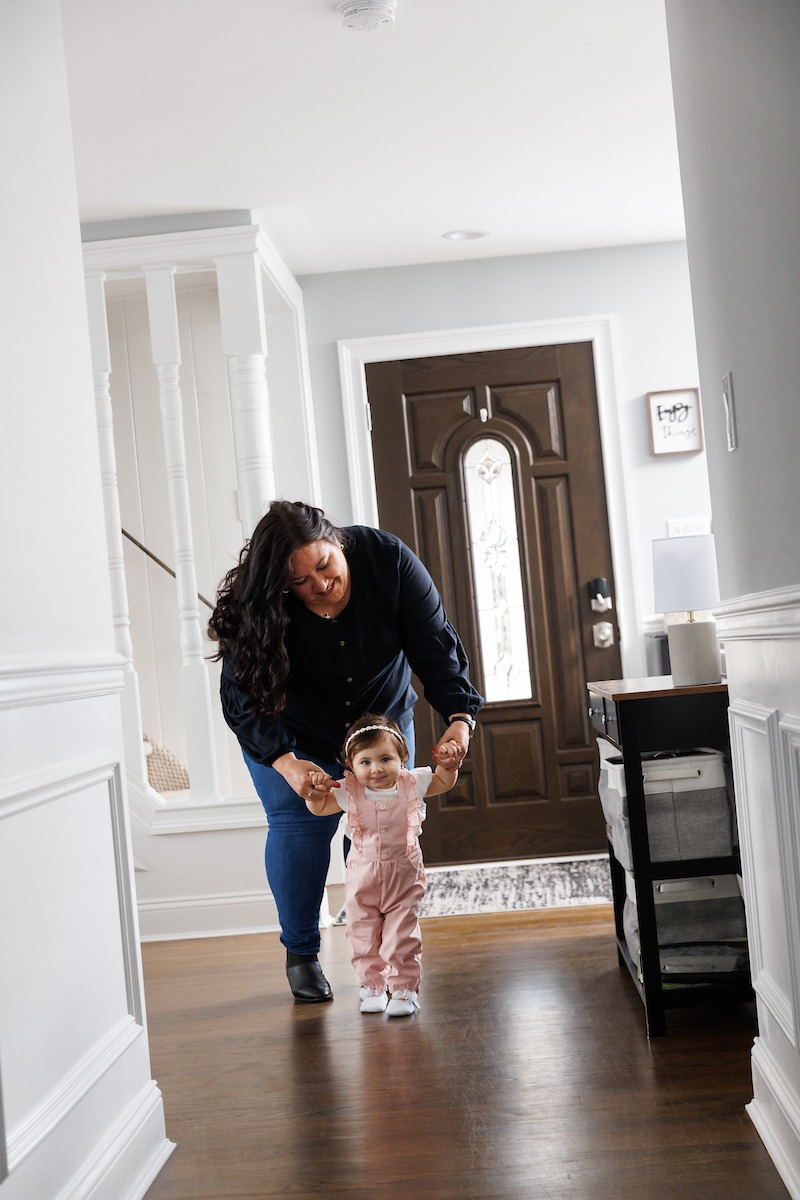
Since 2011, Keri Urban and her husband had been trying to have a second child. At the age of 40, after suffering her 10th miscarriage, Urban was told by her doctor that her chances of carrying a baby to term were slim.
Their daughter, Gianna, had been born through in vitro fertilization (IVF) in 2009. As a young child, Gianna wished for a baby brother or sister, yet she understood the struggles her parents were facing. When she was 8 years old, she watched a TV show in which a friend of a character who couldn’t get pregnant carried her baby for her; Gianna casually mentioned it to her mother.
“She put it in my head that it would be OK to use a surrogate,” says Urban, 46, who lives in Hasbrouck Heights with her family. “It just wasn’t a big deal to her.”
That led Urban and her husband, Anthony Urban, down a path that would ultimately bring them to their surrogate, Yesenia Rosario of East Windsor, who last April gave birth to the couple’s baby girl, Annabella, at Penn Medicine Princeton Medical Center.
The family was overjoyed with the baby—and thrilled with the woman who became their surrogate. “She was incredible—she was so good about keeping in touch and telling me what was going on,” Urban says of Rosario. “I told her, ‘You’re the best!’ And she said, ‘No, we’re the best team.’”

Urban turned to surrogacy after suffering her 10th miscarriage. Her daughter, Annabella, was born last April. Photo by Colin Miller
The Urbans are part of a growing cadre of people in New Jersey who are turning to surrogacy when they need help bringing a child into the world. Since 2018, when it became legal in this state, more people have begun exploring the option of surrogacy. What changed was that gestational carriers could be compensated, and parents who engage surrogates were offered more protections, such as having legal rights over their child before birth.
For many people, celebrities such as Kim Kardashian and Sarah Jessica Parker come to mind as women who have used surrogates, but surrogacy among the non-famous is becoming more common in the United States. Most women who use this method do so because health issues prevent them from either becoming pregnant or carrying a baby to term.
A gestational surrogate is someone who carries a pregnancy created from an embryo using the mother’s or a donor’s egg and the father’s or a donor’s sperm. She doesn’t share any genetic material with the baby. Traditional surrogacy, in which the surrogate’s egg is used to create the baby, has become much less popular in recent years because of the legal and emotional complexities involved.
[RELATED: Egg Freezing Helps Millennials Put Motherhood on Hold]
Same-sex couples are also increasingly using surrogates to have children. NBC 4 New York meteorologist Raphael Miranda and his husband, who live in Union City, welcomed both of their young children via surrogate. Singer Elton John and his husband also had two children through a surrogate.
According to one CDC study, between 1999 and 2013, there were around 18,400 babies born in the United States via a gestational surrogate. But no statistics are kept on the frequency of surrogacy on state levels.
Surrogates are usually paid anywhere between $30,000 and $80,000, but the total cost, including travel expenses and medical care, can amount to more than $100,000.
MORE PROTECTIONS IN NEW JERSEY
Melissa Brisman is a reproductive attorney in New Jersey who helped write the state’s statute on surrogacy. The new law makes it easier for parents who wish to use a surrogate, either in the Garden State or in another part of the country. It stipulates that the child’s birth certificate names the intended parents as the sole legal parents of the baby; however, parents do need to obtain a court order to have their names on their baby’s birth certificate; it’s called a parentage order and it’s done before the baby is born. The law also allows the carrier to choose her own medical care for the pregnancy and delivery, while the intended parents pay for her medical care and related expenses.
Brisman, who lives in Montvale with her family, used a surrogate herself at the age of 26 because she was unable to get pregnant.
“I couldn’t carry the baby, but we had [our own] embryos,” she says. “At the time, surrogacy wasn’t really done. I did everything myself, advertising and putting out fliers. It wasn’t easy.”
Brisman and her husband found a surrogate in Maine who was able to get pregnant with their embryos right away and later give birth to the couple’s twin boys. At the time, Brisman had to go to court to have her name added onto the babies’ birth certificates.
A few years later, the Brismans moved to New Jersey and decided to have another child with a surrogate. Their daughter was born five years after their sons.
Now Brisman, 51, has found a way to help other couples have babies. In addition to a law firm, she runs an agency in New Jersey, Reproductive Possibilities, that connects potential parents with surrogates around the country. When she started, there were only a few agencies in the United States helping with surrogacy; now, there are more than 300.
In New Jersey, where the surrogacy law is fairly new, surrogates are still relatively scarce.
“You often have parents in New Jersey with surrogates elsewhere,” says Rachel Wexler, an attorney who specializes in reproductive and parental rights here and in New York. “It’s definitely a hardship for parents to go out of state,” she says, adding that the cost of flights, hotels and other expenses can add up.
There’s also the complication of navigating surrogacy laws in other states, which are often not as progressive as New Jersey’s. In some states, parents are required to adopt their child after the surrogate gives birth—but that’s not the case here.
“The whole story of surrogacy is people going to such great lengths and putting a lot of time, money and emotional effort into the journey to have kids,” says Wexler.
Brisman was one of the early proponents of legalizing surrogacy in New Jersey, working on it for more than a decade with a committee of attorneys. She lobbied former Governor Chris Christie to have it legalized, but he vetoed it every time the bill came before him. When Governor Phil Murphy came into office, he quickly signed it into law.
Prior to 2018, compensated surrogacy arrangements were prohibited in the state and were unenforceable. In addition, women in New Jersey were not allowed to act as paid surrogates—although it was legal to ask a relative or friend to become an unpaid surrogate.
Previously, surrogates could travel to New Jersey and have the embryos transferred to them here, but the gestational carriers had to live elsewhere, says Brisman.
“New Jersey has great legislation now,” says Brisman. “It’s super easy to do surrogacy here.”
The surrogacy law in New Jersey is considered progressive because parents here don’t have to be married or biologically related to the embryo, as long as the surrogate isn’t related, she says.
Surrogacy became legal in New York state in 2021, but the law is more onerous for intended parents there, making the practice more costly.
A TRANSFORMATIVE CASE

Illustration by Anna Godeassi
New Jersey was at the center of the nation’s first surrogacy controversy in 1985, when Mary Beth Whitehead decided she wanted to keep the baby girl she’d given birth to as a surrogate for William and Elizabeth Stern of Tenafly.
Whitehead had used her own egg—along with William Stern’s sperm—making her the baby’s biological parent. (IVF was not widely available at the time, and Whitehead was inseminated with William’s sperm.) After the baby’s birth, Whitehead named her Sara and fled with the child to Florida. The baby was brought back to New Jersey four months later under a temporary custody order, which the Sterns had obtained.
The Sterns sued, and in 1988, the New Jersey Supreme Court ruled that the couple’s $10,000 payment to Whitehead for carrying the baby was “illegal, perhaps criminal and potentially degrading to women.” Despite this ruling, the court awarded custody of the child to the Sterns, indicating it was in the best interest of the child. The case was the nation’s first court ruling on the validity of surrogacy and ignited a national debate on the morality and legality of the practice.
“Because that case was so public and so awful, it set off a reverberating effect across the country and set off anti-surrogacy legislation in the U.S.,” says Wexler.
The surrogacy law in New Jersey now offers legal protection to couples, in the hope of averting cases such as the one involving Baby M. It has become rare to use a surrogate’s egg now, partly because of this case.
The girl in the case, Melissa Stern, is 37 today. She has kept out of the spotlight, but in 2007, she spoke to New Jersey Monthly and said of the Sterns, “I love my family very much and am very happy to be with them. I’m very happy I ended up with them. I love them, they’re my best friends in the whole world, and that’s all I have to say about it.”
SURROGACY EVOLVES
The surrogacy experience is very different today.
In November 2022, Tracy Ellis and her husband, Mark Ellis, welcomed their second daughter, born through a surrogate who lives in Ohio. When they started the process in 2016, it still wasn’t legal to have a gestational surrogate in New York, where they lived at the time, but they were able to transfer their embryos out of state (although they were not used for their daughter).
Ellis, who works for an insurance company and lives in Glen Rock with her family, had a devastating pregnancy loss when she and her husband were first trying to have a child. A few days later, she had a pulmonary embolism, and her doctor determined that it was unsafe for her to try to get pregnant again. They began looking into surrogates.
They were able to find a surrogate in Cincinnati, Ohio. Tricia had two daughters of her own and worked with kids getting dialysis in a children’s hospital. “We were beyond nervous during the pregnancy, but Tricia was so reassuring and confident. She is kind beyond words and funny, and we get along very well,” says Ellis.
Still, the search to find a surrogate can be challenging. There’s always a long wait list for intended parents, and the situation worsened during the pandemic, says Wexler. “There are women who want to be surrogates, but not everyone will be cleared both medically and psychologically,” she says. “The standards are so high. The surrogates that I’ve worked with were people who wanted something meaningful to do that afforded them some flexibility.”
The requirements to become a surrogate in Jersey are stringent: A woman must be at least 21, in good health, have had at least one child of her own without a difficult pregnancy, be a non-smoker, and have no history of drug or alcohol abuse.
The Urbans were fortunate to find their surrogate, Rosario, in New Jersey, as it made doctor’s visits, as well as the legal aspects, that much easier for the couple.
Keri Urban says their daughter was thrilled when she learned that they had found a surrogate, and that she was pregnant.
It was Rosario’s second time as a surrogate, which she learned about after finding an ad on the Internet. She did some research and explained it to her husband, who at first was confused. (The couple has three children of their own.)
“He said, ‘Wait, is that going to be their baby or your baby?’ In the beginning, he didn’t understand—but later he did,” says Rosario, 39. “I have a friend who had a lot of issues having a baby and getting pregnant. Seeing her so sad like that made me want to help. I said, ‘I’m going to do this for someone. Let me sign up with an agency and see if they choose me.’”

The Urbans were grateful that their surrogate, Rosario, also lived in New Jersey. “She made me feel so comfortable,” Keri says. Photo by Colin Miller
When she first met the Urbans, Rosario was touched by their story. “It really made my heart break when I heard that she had 10 miscarriages,” she says. “I can’t see my life without my kids.”
She became a surrogate as a way of giving back. “I did this out of kindness,” she says. “I grew up in a Catholic family and I felt that I had to help others. I loved to help these two families. They really deserved it and needed it.” And she believes that after her experience as a surrogate, her life changed for the better. It seemed to open doors for her—she now has a good job and financial security. The money she earned will pay for her children to attend college.
Rosario was pregnant and gave birth during the pandemic, which was challenging in terms of attending doctor’s appointments, she says. In the past, she had had fast births, so when she went into labor, she immediately called the Urbans and said to come right away.
“I said, ‘Hurry, the baby wants to come!’” she says. She asked doctors for an epidural to slow down the birth so that the Urbans could be there for the delivery.
“I thought, if I’m going to do this, I have to do it right,” she remembers.
The Urbans made it just in time for the birth, which Keri says was a wonderful experience: “People asked me how Yesenia was able to do it,” says Keri, adding that during their first phone conversation, she asked Rosario how she felt about carrying someone else’s baby. “She said, ‘I’m not giving up a baby, because it’s not my baby.’ She made me feel so comfortable.”
She adds that having Rosario in the same state made the whole experience seamless. Previously, they had been talking to a surrogate in Tennessee, where they would have had to adopt their own baby—because the laws are different there.
Rosario says she would encourage others to become a surrogate. “It’s not about the money…it’s about what you’re going to do for someone to help them have a family. To give that kind of happiness to someone is incredible,” says Rosario. “When I see the baby in Keri’s arms, it makes me so happy for them.”
No one knows New Jersey like we do. Sign up for one of our free newsletters here. Want a print magazine mailed to you? Purchase an issue from our online store.
